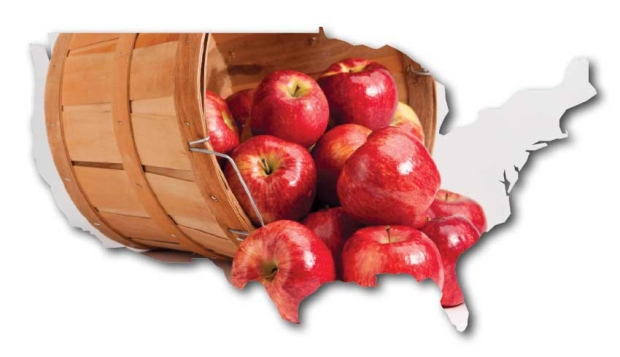
Mike Wade
After a period of relative stability regarding international trade in apples, there are things happening — both good and potentially not so good.
On the positive side, the China market opened to U.S. apples in 2015, and about 1 million boxes have been shipped there already. That’s great.
Looming on the eastern horizon, however, is a real possibility we may shortly see an increase in European apples landing in the U.S. This is not good news, particularly as U.S. exporters have already seen an increase in European apples competing in important markets like Southeast Asia, Latin America and Canada.
You are likely asking, so what changed, and what is being done to stop this from happening? Both are reasonable questions, but it’s complicated and bears some explanation, so let me try.
Many European Union member countries for years have had clearance to ship apples to the U.S. That’s not news.

Good Fruit Grower illustration
Several years ago, those countries petitioned the U.S. Department of Agriculture to switch to a streamlined pre-clearance program to ensure their apples meet phytosanitary safeguards for insects and diseases. This process is allowed under the rules of the World Trade Organization under which the U.S. and our trading partners operate.
The potential impact of this request changed in 2014 when Poland asked to be added to the petition. Unlike the other countries, Poland has never had access to the U.S. market and has not been subject to a formal insect and disease risk assessment. When Poland’s request became known, USApple immediately sent a letter to Agriculture Secretary Tom Vilsack voicing concern and insisted the USDA follow proper scientific procedures.
Poland is the world’s largest apple exporter, and Russia had been its top market. When Russia encroached on the eastern Ukraine, western nations imposed a trade blockade as punishment and Poland sided with the West.
In turn, Russia responded tit-for-tat by shutting out apples from Poland, the EU and the U.S. As a result, without the Russian market, Poland is now shipping more apples to other EU countries and Canada. But what Poland really wants is access to new markets, meaning the U.S. market.
Polish government officials are ratcheting up pressure on the U.S. government to allow in their “freedom apples” just as Canada did when the initial request was made in in 2014. The pressure has been applied as high as the White House, which wants to do all it can to keep the western block united against Russia and is, therefore, favoring the access.
Clearly, the potential for an increase in imports of European apples into the U.S. is not a desired outcome. However, due to WTO rules, the industry is limited in what it can do to mitigate the situation.
This is particularly galling as the EU has effectively shut the U.S. out of its market through the use of nonscientific barriers. Consequently, the EU, which has historically been a top market for New York and other states, has been reduced to a minor outlet.
At a February 29 meeting in the White House, USApple President & CEO Jim Bair spoke directly to U.S. Trade Representative Ambassador Michael Frohman, a member of the president’s Cabinet.
During USApple’s Capitol Hill Day on March 3, teams of growers and shippers met with 75 congressional offices to make this point and ask for support.
Letters signed by the senators from Washington, Idaho, New York and Michigan pressed USDA to delay approving increased access for the EU until an analysis of the pest potential from Poland can be completed.
At USApple’s Leadership Lunch on March 4, the guest speaker was Sharon Bomer Lauritsen, agricultural trade negotiator in the White House office of the U.S. Trade Representative.
We have made the point that the apple industry has always supported free trade, so long as it’s fair trade, but the EU/Poland situation is neither. USDA has responded by announcing a 45-day extension to its approval process. That’s good news.
During this extension period, the industry’s Tree-Fruit Technical Advisory Council (TreeTAC) will review the pest profile of Poland.
Formed in 2001 by the Northwest Horticultural Council and USApple, TreeTAC is composed of top plant pathologists from research universities throughout “apple country,” including Washington State, Cornell, Michigan State, Penn State and others. TreeTAC provides scientific input to help USDA understand phytosanitary risks and to establish science-based policies to protect our orchards from invasive pests.
While it is not realistic to expect that we can stop the systems approach from going forward, we are pursuing all options and insisting that all proper procedures are followed and no foreign pests are allowed in with any EU apples.
USApple will continue to draw attention to the fact we do not have a level playing field so long as we do not have access to their market while they are asking for increased access to ours.
Please do not hesitate to contact USApple or me with your comments, questions and feedback. •
– by Mike Wade of Columbia Fruit Packers is chairman of the U.S. Apple Association.






Leave A Comment